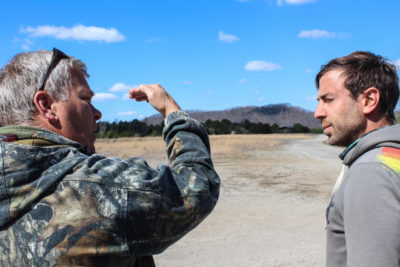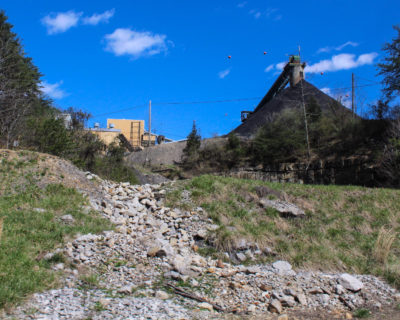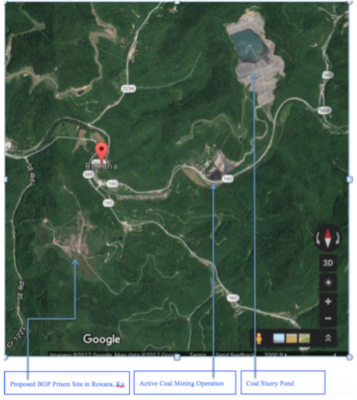Front Porch Blog
Reclaiming Appalachia’s coal lands
This is the third of a series of blogs exploring two federal programs aimed at spurring economic development in Appalachia by repurposing old, unused coal mining sites into new, vibrant economic projects. Looking at the proposed RECLAIM Act and the existing Abandoned Mine Lands Pilot Program, we discuss the need for smart, sustainable and community-driven economic projects, and examine the ones that work, and those that don’t.
For decades, politicians have sold prisons to rural communities with the promise of economic stimulus and stability. Time and again, these promises have failed to materialize, but that hasn’t stopped Rep. Hal Rogers (R – KY) from leading the charge to build U.S. Penitentiary Letcher, a proposed federal prison in his Eastern Kentucky district.
The project is expected to cost close to a half billion dollars, including $5 million from a program designed to fund economic development on — and to incentivize environmental restoration of — lands scarred by strip-mining for coal. This comes at a time when national prison populations are declining and Congress has recently passed the first bipartisan prison reform bill in a generation.
Mitch Whitaker is the fourth generation of his family on land adjacent to the proposed site of USP Letcher.
“I think they just shot [the prison] through here because we’re economically depressed. They said, ‘Here we’ll throw you a bone,’ but I think we should pass on the prison and do something better,” says Whitaker. “We could put an addiction rehab center up there, or build solar panels. A lot of things would be better for this area than a prison.”
AML Pilot Funds and USP Letcher
The state of Kentucky has awarded $4,940,000 of Abandoned Mine Land (AML) Pilot Program funding to Letcher County to subsidize the construction of water and sewer infrastructure for USP Letcher. The pilot program is intended to fund development projects on mined lands that serve as part of an economic transition for formerly coal-dependent communities. While USP Letcher is situated on strip-mined land, the project does not include any environmental remediation. And yet another prison in Central Appalachia could hardly be considered part of the just economic transition advocated by community groups and regional coalitions who have supported other AML Pilot projects.
The state of Kentucky’s use of AML Pilot funds to subsidize USP Letcher illustrates larger problems in the program itself. The AML Pilot Program was created as a result of extensive lobbying, local resolutions, and grassroots activism by community members who wanted to see the land healed and local economies diversified via a bill called the RECLAIM Act. The AML Pilot Program was ostensibly created to explore what could be possible on a larger scale if the RECLAIM Act were passed (see news of its recent introduction in Congress here). But the criteria Kentucky uses to award AML Pilot grants is incredibly loose, to the point that these aims are far from guaranteed.
“There’s nothing abandoned about this particular mine site,” says Mitch Whitaker. “It was reclaimed already. So I thought it was weird that they’re wanting to use an Abandoned Mine Lands program to fund this prison.”
USP Letcher is not dodging any grant criteria by failing to incorporate mine land reclamation — it is simply not a requirement of the AML Pilot Program. Rather, grantees are asked only to demonstrate that the proposed project is on or near Abandoned Mine Lands, even if the particular AML features, such as open mine portals or piles of mining waste, have already been reclaimed, or if those problems will remain unreclaimed despite the implementation of the grant-funded project.
Opposition to USP Letcher
Since Congress first allocated $444 million in funding for USP Letcher in 2016, the proposed prison has been met with local and national opposition. Prison foes argue the project would adversely impact the community and the environment, fail to deliver the promised economic impacts, and expand a mass incarceration system that disproportionately targets black and brown communities.
Locally, the grassroots group Letcher Governance Project emerged with the hashtag #our444million in June 2016, lifting up community members’ visions for more impactful ways to invest in the area. The group also disrupted a Hal Rogers speaking engagement, rebuking the representative for couching the expansion of mass incarceration in language of economic innovation.
In November of last year, a group of federal inmates represented by the public interest Abolitionist Law Center filed a civil suit against the U.S. Bureau of Prisons, challenging the approval of USP Letcher on the grounds that the incarcerated population had not been included in public comment processes prior to the project’s approval.

A neighbor of proposed USP Letcher talks about the former mountaintop removal coal mine where the prison is proposed. Photo courtesy of the Campaign to Fight Toxic Prisons
On March 11, even President Trump came out against USP Letcher by proposing to strip its funding in the 2020 budget. While this is certainly a blow to Hal Rogers, it’s important to note this is just a desired budget cut (Congress, not the president, makes budget determinations), and not an act of altruism on the part of the president. In the same document, Trump proposed to cut more than 80% of funds for various programs assisting formerly incarcerated individuals reentering society. The administration has also redirected more than $80 million of low-interest U.S. Department of Agriculture loans towards local jail construction across the country, and away from projects like emergency services and community centers for rural areas.
Conclusion
A myriad of organizations continue to challenge USP Letcher, using a variety of strategies. Should these efforts fail, and USP Letcher is ultimately built, it will only prove once again that prisons are no solution to the woes of our region. In this case, the environmental and community development advocates whose lobbying helped to create the AML Pilot Program in the first place will have to grapple with the fact that they (we) got played, and inadvertently helped pave the way for such an egregious, false solution to economic hardship.
Considering the prospect of USP Letcher, Mitch Whitaker draws a lesson from the boom and bust of the coal industry in Eastern Kentucky.
“I remember when everyone was working in the mines and things were good, but now that the mines are mostly shut down, we’re seeing what little we’ve been left with,” Whitaker says. “I feel like we got snookered, and now we’ve got to not get snookered again.”
PREVIOUS
NEXT
Related News

Leave a comment
Your email address will not be published. Required fields are marked *



Leave a Comment